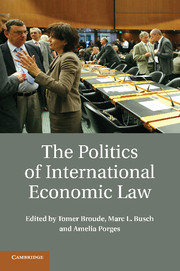Book contents
- Frontmatter
- Contents
- Contributor List
- Acknowledgments
- 1 Introduction
- Part I The Politics of Law Making in International Trade
- Part II The Politics of International Investment Treaty Making
- Part III The Politics of Sovereign Wealth and International Financial Law
- Part IV The Politics of Dispute Settlement in International Economic Law
- Part V Linkages between International Economic Law and Foreign Policy
- Index
1 - Introduction
Some Observations on the Politics of International Economic Law
Published online by Cambridge University Press: 03 May 2011
- Frontmatter
- Contents
- Contributor List
- Acknowledgments
- 1 Introduction
- Part I The Politics of Law Making in International Trade
- Part II The Politics of International Investment Treaty Making
- Part III The Politics of Sovereign Wealth and International Financial Law
- Part IV The Politics of Dispute Settlement in International Economic Law
- Part V Linkages between International Economic Law and Foreign Policy
- Index
Summary
Politics is the art of looking for trouble, finding it everywhere, diagnosing it incorrectly and applying the wrong remedies.
– Groucho MarxIn times of crisis, we are forcefully reminded of the links between politics and international economic law. Indeed, the meltdown in world markets has refocused attention on how the fingerprints of the “visible hand” can be seen all over the institutions that underpin the rules of globalization. From trade and investment to finance, governments are under pressure to enforce, resist, and rewrite international economic law. To be sure, the future of the Bretton Woods institutions is, itself, the subject of heated debate. For legal scholars and political scientists, this is fertile ground; lawyers have seldom given enough attention to the influence of politics on law, whereas political scientists have had an on-again, off-again fascination with how the law influences relations among states. This book is motivated by a deceptively simple question: How do politics and international economic law interact with each other?
Contemporary context, enduring questions
The prominence of international economic issues in the 2008 presidential campaign in the United States, together with the global economic crisis that began to unfold at around the same time, inspired us to take stock of the ways in which politics shapes the legal frameworks within which international commerce takes place. First, and most obviously, the crisis has reinforced the recognition of international economic interdependence.
- Type
- Chapter
- Information
- The Politics of International Economic Law , pp. 1 - 16Publisher: Cambridge University PressPrint publication year: 2011
- 1
- Cited by

